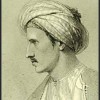
Stephen Arata, “On E. W. Lane’s Edition of The Arabian Nights’ Entertainments, 1838″
The sequence of tales called in Arabic Alf Layla wa Layla was introduced to European readers by way of Antoine Galland’s enormously popular twelve-volume edition of Les mille et une nuits (1704-17). English translations of portions of Galland’s edition appear as early as 1706, and tales designated as belonging to the Arabian Nights circulated in close to one hundred separate editions published in Great Britain before 1800, all of them derived in some way from Galland. Galland had drawn from numerous sources—oral, manuscript, and print—and the provenance of many of the tales he translated was murky at best. The first efforts to produce a definitive Arabic edition of Alf Layla wa Layla date to the first quarter of the nineteenth century. Lane presented his edition as the first in English to be based on the recent Arabic editions rather than on Galland. Lane also took the unconventional view that The Arabian Nights were to be read not for their literary or entertainment value but for the historical and ethnographic light they throw on Arabic, specifically Egyptian, “life and customs and manners.” His copious and often quite lengthy annotations of the tales and his modernized system of transliteration, as well as his unapologetic pedantry, impressed and alienated his first readers in about equal measure.
